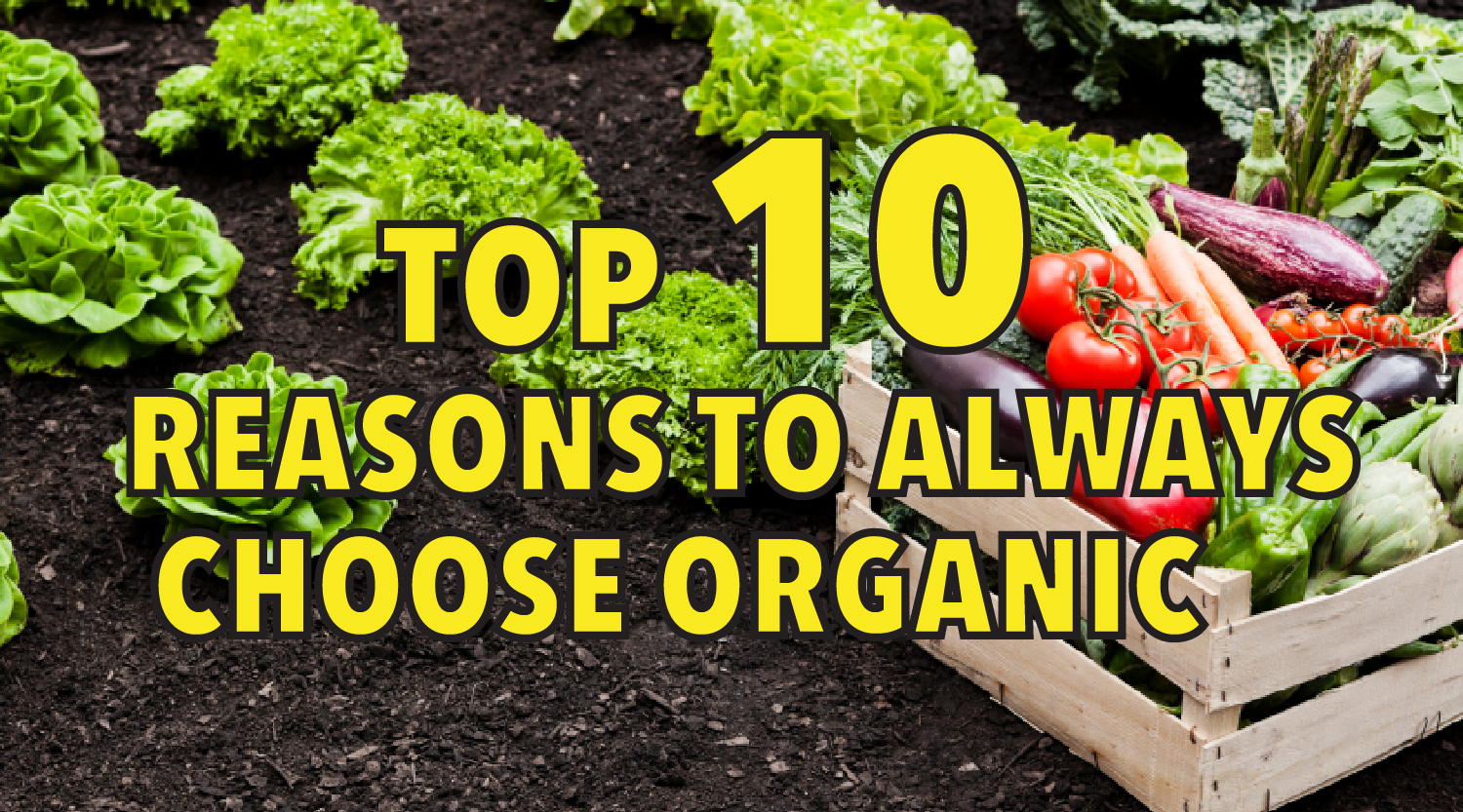Top 10 reasons to always choose organic
08/18/2015 / By Greg White

Children chomping on fresh fruit stirs a healthy picture in most people’s minds. That is until, of course, one realizes that the fruits and vegetables sold on supermarket shelves are clothed in deadly pesticides. These noxious chemicals remain on food even after they are washed and cooked, and have been linked to a host of maladies, including cancer, birth defects and nerve damage.
The time has come to switch to organic. More and more people are opting for unrefined plant food as a substitute for the poison that major food companies shovel down our throats. The evidence is mounting that organic food is a healthy alternative to the Frankenfood artificially created in a lab. Here are the top 10 reasons to always purchase organic.
No harmful chemicals
Glyphosate, a herbicide sprayed on food, has been under the spotlight in recent years. Introduced by Monsanto under the brand name Roundup in 1974, glyphosate was lapped up by farmers as a miracle herbicide that could kill even the most stubborn of weeds. However, several issues regarding the chemical have recently been discovered, one of which is human toxicity. Another problem is that glyphosate is not as biodegradable as it was thought to be, which means its effects last in the soil for a long time. Humans exposed to glyphosate might suffer from itchy skin, congestion, chest pains, diarrhea and even death.
Glyphosate is just one of the chemicals present in non-organic food. Other chemicals include glufosinate, which can cause birth defects, and malathion, which can cause respiratory paralysis and death in high doses.
More natural nutrients
Organic food is chock full of nutrients. Fruits and vegetables grown organically can provide all the vitamins and natural minerals that the human body needs. This is unsurprising, since non-organic foods are produced for bulk rather than quality. Organic foods are grown slowly and with more care, which allows them to absorb minerals from the soil.
No genetically engineered health risks
One of the best reasons organic food stands above conventional food is that the former is not allowed to be genetically modified. Since genetically engineered crops were introduced to the food supply, the world has felt the health repercussions of genetically engineered food. They can cause severe nutritional deficiencies, aggravate allergies and even cause cancers. Organic farmers do not tamper with nature in an artificial way, so their crops do not pose a threat to humans and the environment.
No unnecessary hormones and antibiotics
Animals bear the brunt of non-organic farming methods the hardest. For instance, cows are fed with several chemical-laced foods to increase their milk production. In addition to consuming synthetic food, cows are injected with growth hormones such as rBGH, also known as bovine growth hormone, which is prepared using recombinant DNA technology. They are also injected with preventive antibiotics. All of these chemicals are dangerous to the animals in the long run, causing nerve disorders and other health problems. People who consume meat, eggs or milk made by these animals suffer similar ailments. On the other hand, animals from organic farms are born and bred naturally. The animals are treated humanely and do not carry dangerous hormones and antibiotics that are as dangerous to people as they are to cattle.
Promotes safe drinking water
Most potable water comes from rainfall. When rain falls on the soil, the runoff is gathered in natural and human-made reservoirs, from which it is purified and supplied for drinking. However, if the soil is polluted with chemicals from GMO factory farms, it contaminates the water. The normal water purifying processes used by governments are not enough to remove these harmful chemicals. As a result, the water, though labeled as potable, is dangerous to drink.
More flavor
Organic food tastes better than synthetic food. Organic food take a long time to grow and is usually produced as a concentrated crop in a small number. They contain a much better proportion of natural minerals, vitamins and healthy phytochemicals than synthetic crops, which helps enhance the taste of the crops.
Good for environment
Organic food is biodegradable. They are completely absorbed by the soil and leave no poisonous chemicals behind. This helps preserve the quality of the soil for future generations. Synthetic chemicals have adverse effects in the soil, which can cause soil depletion and erosion. For this reason, crops grown in soil laced with synthetic chemicals are inferior to crops grown in soil devoid of synthetic chemicals. Organic methods help the soil regain its minerals as they are absorbed by the plants. Hence, the plants grow healthier and are markedly better for consumption. It is also more economically viable, because the healthier soil does not need to be kept fallow as much.
Reduce health risks drastically
Most people who turn to organic foods do so because of the health benefits. There are too many health scares associated with the chemicals used in food. The carcinogenic effects of most of these chemicals, such as malathion, are well-documented. Similar chemicals can also cause allergies, cardiovascular problems, nerve disorders, Alzheimer’s disease and congenital defects in children. According to a survey carried out by the EPA, around 60% of the herbicides and 30% of the insecticides that are in wide use today can cause cancers when consistently consumed over a long period of time. To avoid these health risks, it’s better to be safe by choosing organic.
Better for animal life
If more people chose to go organic, it would be beneficial to the animals that are brutalized on factory farms. The growth hormones, food supplements and antibiotics that are pumped into these animals to enhance food production are a cocktail of dangerous chemicals. They can cause various disabilities in the animals, which can run down the generations. The National Organic Program (NOP) has verified that animals should be raised as naturally as possible. They must be given natural fodder and allowed access to the outdoors as they would do in their natural environment.
Maintain ecological environment
Reducing the use of chemicals on farmland is healthier for the environment. Organic farming is wrought by the ancient wisdom of traditional farmers, who know that coupling different kinds of crops together can lead to better yields. Certain kinds of feed or food plants can aid the development of specific animal breeds. These techniques are better than artificial farming techniques and can boost the quality and quantity of crops and animals. They also enhance and sustain the environment for future generations.
Organic farming methods are grounded in ancient wisdom that has stood the test of time. By contrast, non-organic farming methods are tainted by the roots. The health and environmental benefits attached to organic farming are more than enough to trade a genetically engineered apple for a pesticide-free apple any day. Support your local farmers’ market today by eating whole organic food.
Sources:
https://www.organic-center.org
http://www.wholefoodsmarket.com
Submit a correction >>
Tagged Under:
cancer, GMOs, malathion, organic food, Roundup
This article may contain statements that reflect the opinion of the author
RECENT NEWS & ARTICLES
COPYRIGHT © 2017 TOP 10 GROCERY SECRETS





















